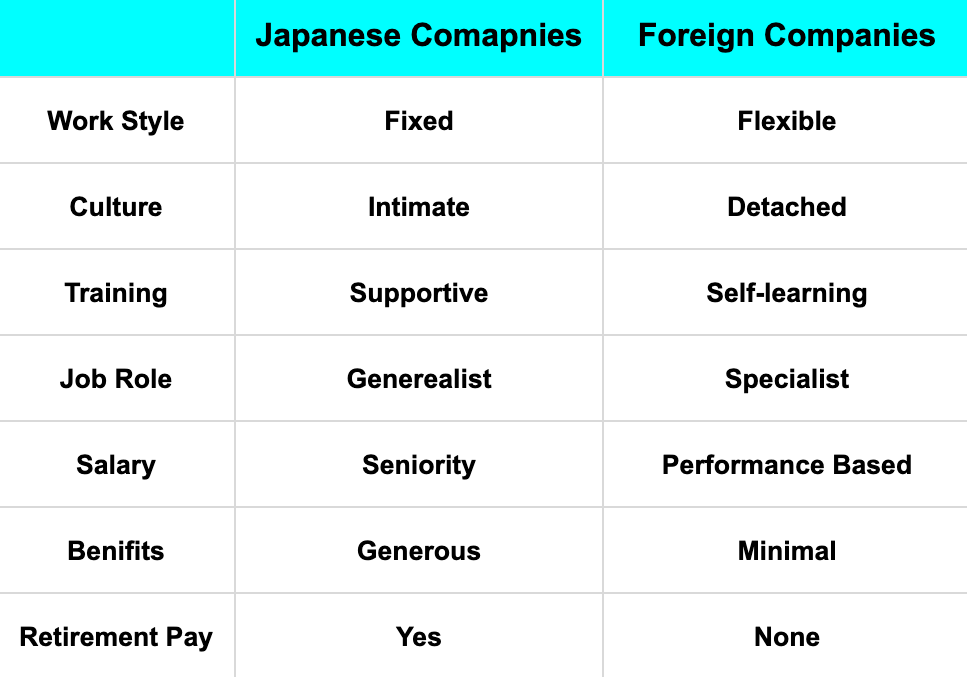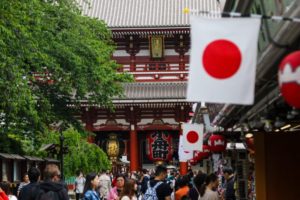Why you should work at a foreign company in Japan
What is a foreign company
When Japanese people do job hunting in Japan, typically they think of start looking companies from two categories. That is Gaishi-kei (外資系) and Nikkei (日系). Gaishi-kei (or just Gaishi) means foreign companies and Nikkei means Japanese companies. Basically, companies like Google and Amazon are Gaishi-kei, and Toyota and Sony are Nikkei.
So, What are the points that separate foreign companies from Japanese companies?
The quick answer would be, the location of headquarters and the breakdown of the equity of the company.
If the companies global headquarters are located outside of Japan and the majority of the companies’ equities are owned by a foreign entity, then it is safe to say that that company is Gaishi-kei. (foreign company)
On the other hand, if the companies’ global headquarters are located in Tokyo and the majority of the companies’ equities are owned by a Japanese entity, then it is safe to say that the company is Nikkei. (Japanese company)
What makes it difficult to judge whether a company is Nikkei or Gaishi-kei is that, in recent years, companies are starting to have a more mixed bag when it comes to the location of headquarters and the shareholders of their company.
If a startup company founded in Tokyo, based in Tokyo, and serving customers in Japan had over 50% of its shares owned by a foreign entity, due to multiple financing rounds, would that be a Japanese company or foreign company?
There are also a lot of companies moving their headquarters to different locations as well. Are these companies still considered Japanese?
What is clear is that, the line between foreign and Japanese is becoming unclear and that these two categorizations are becoming meaningless.
However, as of 2021, there are still a lot of differences between Japanese and foreign companies’ cultures, work environment, people, and salaries. This is the main reason why people in Japan care so much about whether the company is foreign or Japanese.
Are they different from Japanese companies?
So how are foreign companies different from Japanese companies? You may think that since they both are located in Japan, things wouldn’t be so different between the two. Well, you are partly current and partly incorrect. Yes, they are both located in Japan, so they are governed under Japanese labor law. Therefore, foreign companies can’t impose the same work rules in their Japanese branch, as they do in other locations.
Also, in both Japanese and foreign companies, most people working there will be Japanese people. Some people have a misconception that in a foreign company there are a lot of people of foreign nationalities working there and the atmosphere of the company is something completely different from that of a Japanese company.
However, the truth is that in a mid to large size foreign company in Japan, there might be a higher percentage of foreigners working in the company, but they still will be representing a small percentage of the entire employees of that company. Therefore, in reality, a foreign company in Japan may just feel slightly foreign than Japanese companies, but it is pretty much like a Japanese company overall.
In conclusion, foreign companies and Japanese companies aren’t so different compared to companies actually located outside of Japan. However, there is a slight difference in some points such as salary and work rules. In the next section, we will talk about this in more depth, but we have also written articles about foreign companies and their characteristics. If you are interested, please have a look at these articles as well.
Working at a foreign company in Japan. Reality of working at a Gaishi (外資).
Difference between Japanese and foreign company in Japan (外資, Gaishi)

List of typical characteristics of a foreign company in Japan
What makes foreign companies in Japan so special?
The graph below, compared how Japanese companies and foreign companies differ in each criterion regarding work environment. (This graph was taken from our previously written article, Difference between Japanese and foreign company in Japan (外資, Gaishi)).

These are the main differences between Japanese and foreign companies.
In general, someone who has ambitions to make a lot of money, and gain professional skills early in their career, tends to choose foreign companies. This is because foreign companies offer a higher salary to someone who’s fairly young. In Japanese companies, salaries are decided according to your job level, and bonuses are usually distributed based on the companies results. Therefore, it usually takes longer for someone working in a traditional Japanese company to make a lot of money. (They typically have to wait until they are in their late 30s or 40s.)
On the other hand, someone who doesn’t want to rush climbing the corporate ladder and wants a better work-life balance tends to choose to work at a Japanese company. However, as mentioned above this separation of Japanese and foreign companies is becoming more and more meaningless, as both categories are trying to incorporate good points from each other.
For example, traditional Japanese companies are starting to incorporate flexible work hours and trying to allow a more free work style. If you would like to learn more about the situation regarding Japanese companies and flexible work hours, please have a look at this article.
Jobs with flexible hours in Japan. Does Japanese companies allow flex work?
Therefore, you won’t be able to judge and predict what the company is like just by the company being a foreign or Japanese company. You will need to really look into the company by reading the recruitment guidelines and other official documents published by the company.
In addition to that, you will need to look into company review sites as well. Company review sites are websites that gather current and former employees’ actual experiences and allow users to read through them. Xkula is also a company review site, and it can help you immensely if you are an English speaker who is looking for company reviews about companies located in Japan. If you want to learn more about company review sites, please have a look at these articles below.
4 company review websites that people use in Japan. (Review companies in Japan)
Glassdoor vs xkula.com: Which is better for job seekers in Japan?
4 reasons why company reviews in Japan are important for you.
Choosing from foreign and Japanese companies
Choose wisely! Know what to expect
Now that the separation between foreign and Japanese companies is becoming more and more meaningless, it is important for you to not assume what the company can provide and actually go learn about what the company is like by asking people, attending seminars. reading articles and company reviews. It is really important to know what to expect from a company before joining the company, especially if you came from another country.












